#( — ⋆ erebos & helios. )
Text
✨ Subtle Deity Worship Master List ✨
Greek Deities:
Subtle Aphrodite Worship
Subtle Ares Worship
Subtle Apollo Worship
Subtle Artemis Worship
Subtle Athena Worship
Subtle Dionysus Worship
Subtle Eros Worship
Subtle Hephaestus Worship
Subtle Hermes Worship
Subtle Demeter Worship
Subtle Hera Worship
Subtle Zeus Worship
Subtle Circe Worship
Subtle Hestia Worship
Subtle Helios Worship
Subtle Persephone Worship
Subtle Poseidon Worship
Subtle Hekate Worship
Subtle Hygeia Worship
Subtle Nemesis Worship
Subtle Psyche Worship
Subtle Asklepios Worship
Subtle Haides Worship
Subtle Harpocrates Worship
Subtle Erebos Worship
Subtle Medea Worship
Subtle Tyche Worship
Subtle Lethe Worship
Subtle Selene Worship
Subtle Eris Worship
Subtle Themis Worship
Subtle Talos Worship
Subtle Thanatos Worship
Subtle Nyx Worship
Subtle Pan Worship
Subtle Hypnos Worship
Subtle Charybdis Worship
Subtle Hyacinthus Worship
Norse Deities:
Subtle Sigyn Worship
Subtle Loki Worship
Subtle Baldr Worship
Subtle Freyr Worship
Subtle Odin Worship
Subtle Freyja Worship
Subtle Thorr Worship
Subtle Tyr Worship
Subtle Jormungandr Worship
Subtle Hel Worship
Subtle Sleipnir Worship
Subtle Idunna Worship - created by @soil-and-stanzas :)
Subtle Fenrir Worship
-
This list will be updated as I make more posts! I may have to make extra posts due to the fact that you can only have 100 links per post.
#helpol#hellenic polytheism#hellenic pagan#paganblr#pagan tips#deity worship#norse pagan#norse heathen
3K notes
·
View notes
Text
I feel restless, so I choose to follow my true nature and post some "fun" facts about greek mythology and its pantheon, enjoy.
Fact 1- Nyx, the primordial goddess of night & Erebos, the primordial god of darkness, have 2 children that are the complete opposite of their parents. Hemera, the primordial goddess of the day & Aether, the primordial god of light.
Fact 2- Helios, the Titan of the sun & and Selene, the Titan of the moon, have a sister. Eos, the Titan of the dawn.
Fact 3- Hades actually did almost cheat on Persephone, twice. The almost is because Persephone shut them down before anything could happen. RIP Minthe.
Fact 4- One of Nyx's children is Philotes, who is pretty much the goddess of friends with benefits.
Fact 5- Every single one of your ten fingers has an individual Greek deity associated with them. No, I am not joking.
Fact 6- Unsurprisingly, Hera's marriage to Zeus is completely without her consent. She never liked him, and especially didn't want to marry him.
Fact 7- Immediately after being born herself, Artemis helped her mother Leto give birth to Apollo.
Fact 8- After ascending to Olympus, Herakles got married to Hebe, the goddess of youth. And before you ask, yes, she is also his half-sister.
Fact 9- Historical research shows that Persephone existed and was worshipped as an underworld deity long before Hades existed.
Fact 10- Aeneas, the mythical founder of the Roman empire, was a son of Aphrodite/Venus.
Fact 11- Harmonia, the goddess of harmony, is the daughter of Ares, the god of war.
Fact 12- The Nemean lion, the Chimera, and Cerberus are siblings. Their parents are Typhon, the king of all monsters, and Echidna, the queen of all monsters.
That's all for now. Do with this info what you want.
#greek mythology#the greek gods#ancient greek mythology#ancient greece#greece#greco roman#mythology#history
10 notes
·
View notes
Note
Hey, do you think a vampire could or would worship Gods and Goddesses?
Which God or Goddess from the the Greek or Roman pantheon (or any pantheon you like) do you think a vampire would worship? Who would they be drawn to?
Do you think their acts of devotion would be different from that of mortals? 💜💚
Hecate for underworld and magic

Ares, Bellona for bloodlust
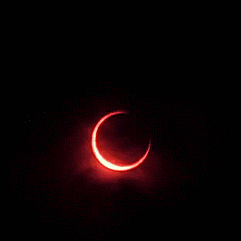
Erebos for darkness and underworld

They might worship and fear the Sun Gods most. Apollo and Helios. 🌻

Maybe they even worship a moon goddess Diana, Selene or Artemis.

Maybe an ancient vampire would have an own temple for worshipping their gods. Maybe the vampire would worship the gods the same way they already did when they were alive. Maybe becoming a vampire made them worship different gods than before. Maybe as a Vampire they are even more able to connect to anything spiritual and otherworldly.
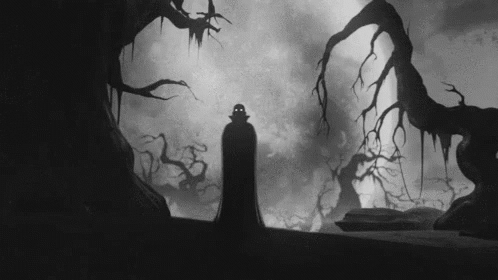
3 notes
·
View notes
Text
I am going to pick the voice actors for my gods, RS’ dream cast for her LO live action is just for points and not even there to play the roles and she only picks her celebrity crush Mads to be Christian blue I know. So I am going to pick the voice actors who can fit my characters perfectly and here they are. So let’s start with the gods. Ok let’s gooo!
Note: some of the characters have the same voice actors and who voiced their characters from the same anime, because I want to fit some of the voices, who can fit my characters.
Adonis: Justin Briner, who voiced Hanako from Toilet-Bound Hanako-kun
Amphimarus: Brian Timothy Anderson, who voiced Sousaku Yubiwa from Pretty Boy Detective Club.
Ampelos: Kyle Igneczi, who voiced Sosuke Mitsuba from Toilet-Bound Hanako-kun.
Anteros: Aris Athanasopoulos, who voiced Hermes in Immortals: Fenyx Rising.
Apollo: Adam Croasdell, who voiced Apollo in Blood of Zeus.
Ares: Matthew Mercer, who voiced Levi from Attack on Titan.
Astraeus: Brad Swaile, who voiced Light Yagami / Kira in Death Note.
Cerberus: Landon McDonald, who voice Rampo Edogawa from Bungo Stray Dogs.
Charon: Clint Bickham, who voiced Shoichiro Yukimura in Maid Sama.
Chiron: Justin Doran, who voiced Daichi Sawamura from Haikyū!!
Cronus: Yuri Lowenthal, who voiced Dainsleif from Genshin Impact
Dionysus: Landon McDonald, who voiced Enmu from Demon Slayer.
Endymion: Max Mittelman, who voiced Resasuke from Aggretsuko
Erebos: Kirby Morrow, who voiced Teru Mikami from Death Note.
Eros: Vic Mignogna, who voiced Greece from Hetalia (if that is possible).
Ganymede: Howard Wang, who voiced Nagahiro Sakiguchi from Pretty Boy Detective Club.
Hades: Corey Hartzog, who voiced Kanato Sakamaki in Diabolik Lovers.
Helios: Jerry Jewell, who voiced Aion in Show By Rock.
Hephaestus: Clint Bickham, who voiced Kenma Kozume in Haikyū!!
Hercules: Bryce Papenbrook, who voiced Meliodas from The Seven Deadly Sins.
Hermes: Todd Haberkorn (my favorite) who voiced Hikaru Hitachiin from Ouran High School Host Club.
Hypnos: Greg Kasavin, who voiced Hypnos from Hades.
Morpheus: my former dream voice actor Billy Kametz, who voiced Rui from Demon Slayer (I love that guy 🥲) or Cory Yee, who voiced Hermes in Record of Ragnarok.
Nerites: Justin Briner, who voiced Mio Chibana from The Stranger by the Shore.
Ouranos: Jonah Scott, who voiced Sniper Mask from High-Rise Invasion in a Greek accent.
Pan: Todd Haberkorn, who voiced Keroro from Sgt. Frog
Phantasos: Vincent Tong, who voiced Touta Matsuda from Death Note.
Philomelus: Cristina Valenzuela, who voiced Bennett from Genshin Impact.
Phobetor: David Hurwitz, who voiced Mello / Mihael Keehl from Death Note.
Plutus: Jeannie Tirado, who voiced Norman in The Promised Neverland.
Poseidon: Bumper Robinson, who voiced Poseidon from Record of Ragnarok.
Tartarus: Erik Kimerer, who voiced Obanai Iguro from Demon Slayer in a Greek accent.
Thanatos: Chris Saphire, who voiced Thanatos from Hades.
Triton: Cory Yee, who voiced Gorou from Genshin Impact.
Zagreus: Darren Korb, who voiced Zagreus from Hades.
Zephyrus: Bryson Baugus, who voiced my Shoyo Hinata in Haikyū!!
Zeus: Ben Schwartz, who voiced Yogurt Cream Cookie from Cookie run Kingdom.
Demigods and heroes and mortals
Demigod/heroes
Achilles: Daman Mills, who voiced Milk Cookie from Cookie Run: Kingdom.
Asclepius: Adam Gibbs, who voiced Koshi Sugawara from Haikyū!!
Hector: Matthew Mercer, who voiced Hermes from Blood of Zeus
Helenus: Griffin Burns, who voiced Muichiro Tokito from Demon Slayer.
Hyacinth: Lucien Dodge, who voiced Zoisite (in a playful and funny tone) from Sailor moon.
Jason: Griffin Burns, who voiced Ryota Suzui from Kakegurui.
Iasion: Khoi Dao, who to voiced Herb Cookie in Cookie Run: Kingdom.
Odysseus: Liam O'Brien, who voiced Nephrite from Sailor Moon.
Orpheus: Greg Kasavin, who voiced Orpheus from Hades.
Paris: Jessie James Grelle, who voiced Armin Arlert in Attack on Titan.
Patroclus: Behzad Dabu, Lilac Cookie in Cookie Run: Kingdom.
Peleus: Kyle McCarley, who voiced Hitohito Tadano from Komi Can't Communicate
Perseus: David Matranga, who voiced Takumi Usui from Maid Sama.
Theseus: Cyrus Nemati, who voiced Theseus from Hades.
Mortals
Crocus: Josey Montana McCoy, who voiced Kaeya from Genshin Impact.
Icarus: Antony Del Rio, who voiced Pit from Kid Icarus.
Narcissus: Jalen K. Cassell, who voiced Thor from Record of Ragnarok.
Thamyris: Lucien Dodge, who voiced Ookami from Aggretsuko
What do you think?
5 notes
·
View notes
Note
Imagine if Hyperion gets out during Dawn, so the first thing he ever gets to see again is Light
Hyperion looked up at the sky.
In Tartarus the only light he held came from himself, and from the River of Fire. There was no other light to be seen and the fire did not grant nearly enough.
Hyperion had missed the light, had missed the light of his Son (the Sun) on his skin. Had missed the fingers of Eos stretching over the horizon, heralding Hemera. He'd missed the light of the Heavenly Aether above which they'd lived their immortal lives in.
Hyperion had always craved the light, the light of the Sun, the light of the Moon, of the Dawn and Dusk, the Stars-
He'd always craved Light, he was Light. Being trapped in the Dark, in the deepest Pit with only his own existence to brighten the Mists of Erebos- it had been the worst punishment that could be given.
But now, now he stood above the land once more. His eyes were locked on the horizon as his daughter's fingers curled over the edge, her brilliantly beautiful, multicolored form peeking up as the first rays of Helios shone into the sky. Selene dipped below the horizon as warmth fell upon his skin, light warming him in a way he'd not been warmed for an eternity.
They were Deathless, Immortal, Divine... But that Life without Light was- it was worse than Death.
And Hyperion was so so glad now, now that he had his children shining down on him once more.
He'd missed the sunrise.
And so he basked, basked in the light. He basked in the sun rays creeping over the horizon. He basked in the light that chased away the Darkness of Nyx, that burned away the Mists of Erebos.
He basked in the Light, in His Light. And for the first time since they'd been thrown in Tartarus, he let his form stop glowing.
23 notes
·
View notes
Text

no habían pasado mucho más de cinco minutos desde que el pelinegro lo había dejado solo, pero al parecer esos minutos habían sido suficiente tiempo para que el rubio hiciera de las suyas en el closet de hyperion y jiyong, y erebos no pudo no sonreír al verlo – a pesar de que sabía perfectamente bien que iba a ser él quien tuviera que ordenar todo antes de que los humanos regresaran. ❝ bueno, veo que encontraste una manera de entretenerte en mi ausencia. ❞ dijo, acercándose a él con el plato de galletas en una mano y un vaso de leche en la otra. ╱ @jeontrol
#ok esto me quedó bien horrendo pero AMO A ESTOS BEBÉS ok bye#✧ * ☾ 「 ❛ EREBOS ┊ words ❜ 」#( — ⋆ erebos & helios. )#jeontrol
10 notes
·
View notes
Text
Mnemosyne
Eris sits on the floor, throwing knives at a blue printout of the letter t. Hekate paces the floor out of range, a pack of black dogs following her steps. She is fiddling angrily with a set of keys in her left hand, the tattoo of a snake writhing in pain around her right.
As the thunk of another blade hits the target, Eris jolts up from her seat. Her gaze is wild with fury, and her memory perfect. Hekate glances at her, metallic eyes glittering like so many of the daggers in the wall. They are in agreement.
Like blood and quicksilver, the Lady of Riots and the Mistress of the Crossroads glide through the halls of the Underworld. A hoard of hounds and shades follow them, the battle-cries of forgotten revolutions cutting through the silence. The heavy air is thick with it, rousing the dead from their slumbering walk. The victims of tyrants shake with remembrance. This is what they died for, this and so much more.
They reach the gates, a black wall encompassing the whole of the murky realm, alive and awake and shuddering. Hekate shoves the keys like a borrowed gift into the lock, the wall parting before the amassed spirits like an ocean of ink.
The glint of starlight is just beyond, and the pound of hungry feet echoes through cities and under streetlamps.
It echoes in graffiti and burning trash-cans.
It echoes in the brazen screams of the young, and in the weary cries of the old.
And somewhere, in it all, He is there. The fleet-footed, the messenger, the one who brings the martyrs home. He is there, screaming with them. He is their words and he is their solace. He is the thief and the wanderer. He is their implement when they have none. He is as familiar with the streets of their city as they are.
Through the night, the city shatters, and when the sun rises it is in infinite fragments. The young are staring at a Sun that has risen before them too many times to count. They are staring at a Sun that has burned for them forever, and while in the Winter air it is cold and distant, still it is trying to keep them alive while they fight to live. The young who feel old stare on and the Old who are infinitely young remember. And they will not let you forget.
December 17th:
497 BC – The first Saturnalia festival was celebrated in ancient Rome.
1777 – American Revolution: France formally recognizes the United States.
1819 - Simón Bolívar declares the independence of Gran Colombia in Angostura (now Ciudad Bolívar in Venezuela).
1862 – American Civil War: General Ulysses S. Grant issues General Order No. 11, expelling Jews from parts of Tennessee, Mississippi, and Kentucky.
1918 – Darwin Rebellion: Up to 1,000 demonstrators march on Government House in Darwin, Northern Territory, Australia.
1927 – Indian revolutionary Rajendra Lahiri is hanged in Gonda jail, Uttar Pradesh, India, two days before the scheduled date.
1944 – The U.S. Army announced the end of its policy of holding Japanese-Americans in internment camps, allowing "evacuees" to return home.
1951 – The American Civil Rights Congress delivers "We Charge Genocide" to the United Nations.
1989 – Romanian Revolution: Protests continue in Timișoara, Romania, with rioters breaking into the Romanian Communist Party's District Committee building and attempting to set it on fire.
1989 – Fernando Collor de Mello defeats Luiz Inácio Lula da Silva in the second round of the Brazilian presidential election, becoming the first democratically elected President in almost 30 years.
2003 – International Day to End Violence Against Sex Workers is founded by Dr. Annie Sprinkle and the Sex Workers Outreach Project USA, an American sex worker rights organization.
2014 – The United States and Cuba re-establish diplomatic relations after severing them in 1960.
2018 –Tumblr implements a new policy targetting freedom of expression among the oppressed while allowing the oppressive class to run rampant.
#erebus#erebos#hekate#eris#nyx#hermes#apollo#apollon#helios#civil rights#dec 17th#antifa#pagan#paganism#hellenic polytheism#hellenic reconstructionism#hellenic pagan#witch#witchblr#witchy#america
7 notes
·
View notes
Photo


Oh, thanks heaven! The fugly Viktor is finally gone from main menu screen.
#paladins#paladins champions of the realm#lian#strix#and of course those chests must cost 300 crystals each#I'm amazed HiRez didn't throw FN-01 Helios/Erebos in while they were at it
7 notes
·
View notes
Text
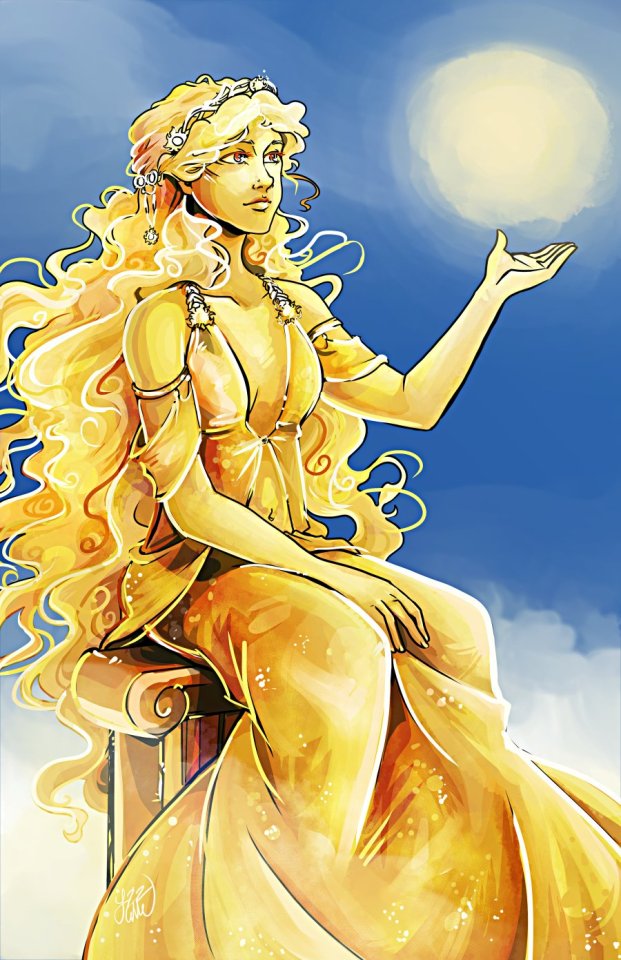
Today I want to talk about a deity in the Hellenic Pantheon that is unfortunately one of the more obscure and less talked about deities despite her importance especially as an opposite of Nyx. Ever since her sudden appearance in my life this year I’ve been itching to make a post like this, a guide and overview of a deity that’s the light of my life (/j) both historically backed as well as UPGs to make up for her lack of an official cult, readily listed epithets, or symbols of worship. Think of this as almost like a starting point for a goddess so important and invaluable in our lives to anyone that might read this that worships her or wants to worship her and is at a loss.
Hemera, one of the Protogenoi, and one of the Theoi Ouranioi was one of the first gods and the personification of day: both the daytime and the daylight always found in the sky during that time frame. Her parents typically are listed as Nyx and Erebos together, but sometimes Khronos (Time) and Nyx, or Khaos on her own are listed as her parent(s). Hemera’s brother and husband is Aither (personification of light and the bright, blue ether of the heavens) and their daughter is Thalassa, and in more rare cases Gaia and Ouranos are also listed as their children too. Hemera’s home is shared with Nyx in Tartaros but is only occupied by one of the two at a time where one rests and the other is active and playing their role in the universe.
Hemera’s role as a goddess in effect is akin to metaphorically leading everything and everyone that falls under her domain as the one ushering day in, the first one that gets the ball rolling every morning. She greets Nyx for but a moment or two as night recedes and falls day in and day out in an eternal cycle as she parts the veil and dispels the mists so the blue sky and all the light that comes with it and the sun become known to those that inhabit Earth.
Typically, other goddesses associated or closely tied to her are Hera for her position as Queen of the Heavens in a similar manner to Zeus’ connection to Aither. Eos as the goddess of dawn is also connected with Hemera where their names would be used interchangeably. There is not a lot of art depicting her from ancient Greece, and we do not have any signs of her having a cult or temple more in line with what’s typical for the first deities outside of a few exceptions. Interestingly despite the lack of a cult, a shrine to Hemera and Helios was found on the island of Kos. Unimportant tidbit, but interesting and a little fun that based on context her description as ambrosial-faced most likely means she has a pleasing face and she’s easy on the eyes, beautiful and potentially invoking warmth and light.
Alternate ways her name is spelled: Hêmerê (Ionian), Amera (Doric), and Amara (Locrian)
Colors I associate with her:
Any shade of yellow
Lighter/softer shades of orange
Pink
Purple
Sky blue
Gold
UPG sacred animals and plants:
White horses
The dawn chorus - comprised of birds like the Dartered trogon, Red-winged blackbird, Song thrush, Common chiffchaff, American robin, Tufted titmouse, Common pheasant, Baltimore oriole, Northern cardinal, Common chaffinch, Chipping sparrow, and the Yellow warbler
Sunflowers
Black-eyed Susan
Zinnia
Yarrow
Hellebores
Epithets (Almost all UPG since she has none):
Light-bearing
All-surrounding
Bringer of light
Light giver
One who bathes us in light
Golden-winged
Dispeller of night
Night chasing
Chaser of night
Ambrosial-faced
The one that holds all-seeing light
Radiant
Far-shining
Horse-driving
* The last five epithets are the rare ones actually historically tied to Hemera
Art by yeselleyes on twitter
#hemera#hemera deity#helpol#hellenism#hellenic polytheism#hellenismos#hellenic religion#hellenic worship#hellenic deities#hellenic gods#theoi#theoi worship#deity work
386 notes
·
View notes
Note
Your Hades is too beautiful for this good earth. By which I mean you’ve got an enormous fan in me! I love the Near Eastern influences you’ve used in your design (and his kohl eyeliner could kill a god at 30 paces)! I have really enjoyed your art!!
Ahh THANK you so much anon, you made my day so much??!? I mean, I literally printed the ask and put it in my novel storyboard
;w; ❤️

I was really hoping someone would notice Hades' kohl because in my novel, the underworld is meant to have Near Eastern influences, it's supposed to be "less Greek" than Olympus, and therefore, a "foreign" land. So when Persephone is there she is fascinated and a bit confused at the same time :D And obviously Hades' looks are part of this cultural surprise? <3 :p so I'll drop a drawing here because Hades is handsome and Persephone is melodrama Queen.
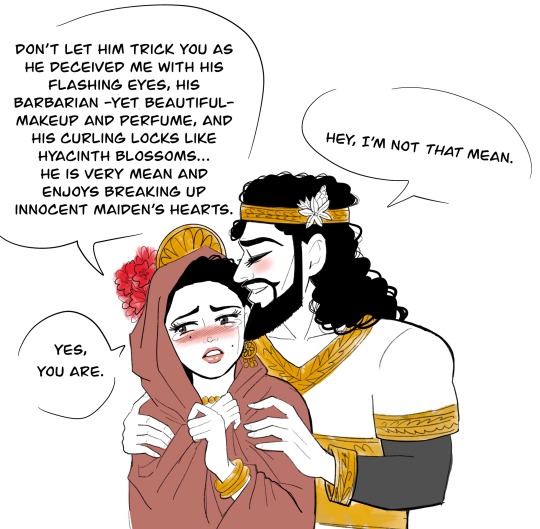
Also, just like in some ancient beliefs, Hades' eye makeup is meant to be protective against the sun and... also eternal darkness. It's dual protection, since, from the speleology and bioespeleology studies I have done, creatures that live in the deepest caves either lack eyes or are highly sensitive to sun exposure. Also, the lack of sunlight can be detrimental to mental health (o.o like it can cause hallucinations among other symptoms, and there are distortions in the sense of time which seems to pass more quickly than above, this is something very important in my novel! Like Persephone thinks she has spent X time in the underworld when it's a lot more. Also, the "nights" are longer and they sleep more than Olympians do and etc). Anyway :D going back to Hades, since he is an Olympian deity who moved to the underworld, he needs to take care of his eyes. In the underworld, there is very little use of light (like oil lamps) to not disturb the troglofauna (aka small cave-dwelling animals). So it is a dark gloomy place where Erebos roams free. o_o... And, to protect his eyes, Hades has this cosmetic given by Erebos that allows his eyes to remain healthy in this endless darkness. And, the counterpart is that, if he goes outside, like, to Olympus or Earth where Helios shines, the cosmetics will protect his eyes from the sunlight as well.
The full design is meant to be like this, which is a sun or star symbol that is present in many underworld-setting vases (and according to the books I've read, these symbols do represent the underworld -like, apparently stars can be seen there, although not the sun-). I don't draw the full design all the time (because in the novel they can change the design or how much of it is seen). Also, Persephone has to start wearing the kohl to protect her eyes too, but she uses a different design from Hades.
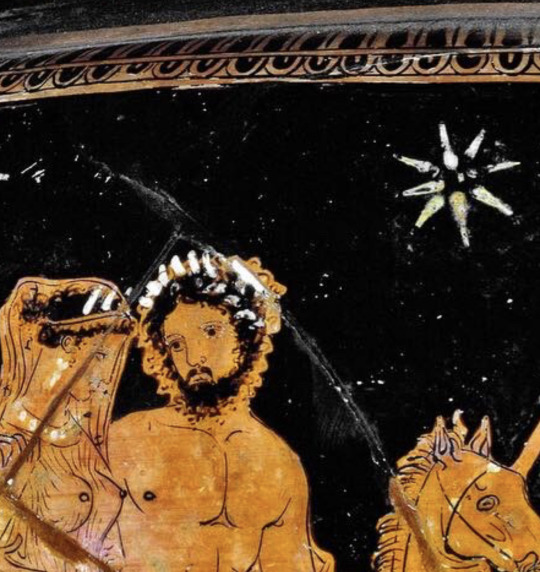
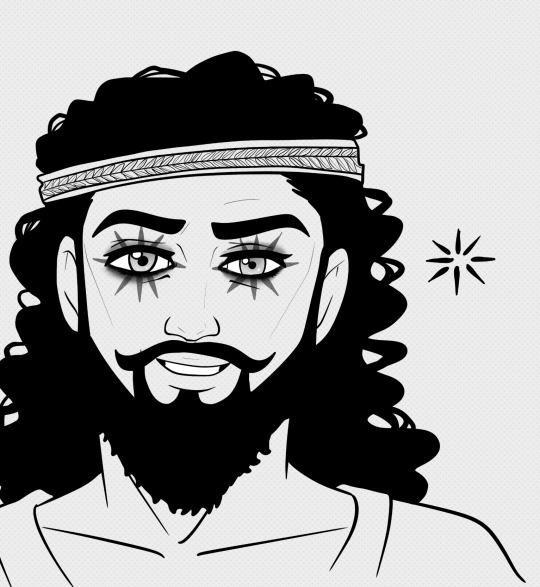
;w; thanks for your support and I hope you keep enjoying my art?? ❤️
#happy#ask#like im seriously going to print all happy and supportive comments because there are so many kind and friendly people around :3#hades#my book trash
14 notes
·
View notes
Text
Just making a separate post for these moodboards, because the list is getting very long.
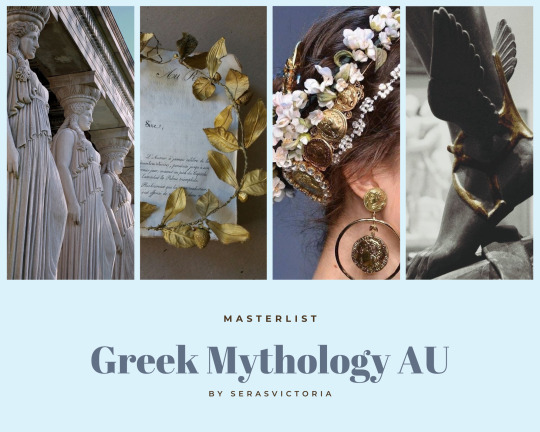
Vikings
Hvitserk as Eros and Dionysus
Halfdan the Black and Harald Finehair as Castor and Pollux
Ivar as Hades Ivar as Hades 2
Bjorn as Ares
Sigurd as Apollo
Ubbe as Hermes
Torvi as Artemis
Ragnar as Zeus
Lagertha as Demeter
Aslaug as Aphrodite
Floki as Poseidon
Helga as Hestia
Gunnhild as Nike
Margrethe as Medusa
Rollo as Hephaestus
Siggy as Circe
Gisla as Athena
Poseidon Floki and Hestia Helga (requested by @quantumlocked310)
Freydis as Tisiphone
Katia as Nyx
Heahmund as Icarus
Thora as Eunomia
Amma as Eirene
Ingrid as Hecate
Ecbert as Minos
Judith as Medea
Kwenthrith as Lyssa
Aethelwulf as Hector
Aethelred as Thanatos
Alfred as Orpheus
Astrid as Nemesis
Gyda as Iris
Thorunn as Pandora
Aud as Harmonia
Oleg as Erebos
Igor as Hypnos
Athelstan as Helios
Othere as Asclepius
Olaf as Charon
The Last Kingdom
Hild as Hera
Aethelflaed as Persephone
Skade as Selene
Uhtred as Heracles
Iseult as Asteria
Gisela as Leto
20 notes
·
View notes
Text
Greek Deities (male)
ACHELOUS - The patron god of the “silver-swirling” Achelous River.
Aeolus - Greek god of the winds and air
Aether - Primordial god of the upper air, light, the atmosphere, space and heaven.
Alastor - God of family feuds and avenger of evil deeds.
Apollo - Olympian god of music, poetry, art, oracles, archery, plague, medicine, sun, light and knowledge.
Ares - God of war. Represented the physical, violent and untamed aspect of war.
Aristaeus - Minor patron god of animal husbandry, bee-keeping, and fruit trees. Son of Apollo.
Asclepius - God of medicine, health, healing, rejuvenation and physicians.
Atlas - The Primordial Titan of Astronomy. Condemned by Zeus to carry the world on his back after the Titans lost the war.
Attis - A minor god of vegetation, fruits of the earth and rebirth.
Boreas - A wind god (Anemoi) and Greek god of the cold north wind and the bringer of winter. Referred to as “The North Wind”.
Caerus - Minor god of opportunity, luck and favorable moments.
Castor - One of the twins, Castor and Pollux, known as Dioskouri. Zeus transformed them into the constellation Gemini Cerus - The large and powerful wild bull tamed by Persephone and turned into the Taurus constellation.
Chaos - The nothingness that all else sprung from. A god who filled the gap between Heaven and Earth and created the first beings Gaia, Tartarus, Uranus, Nyx and Erebos.
Charon - The Ferryman of Hades. Took the newly dead people across the rivers Styx and Acheron to the Greek underworld if they paid him three obolus (a Greek silver coin).
Cronos - The god of time. Not to be confused with Cronus, the Titan father of Zeus.
Crios - The Titan god of the heavenly constellations and the measure of the year..
Cronus - God of agriculture, leader and the youngest of the first generation of Titans and father of the Titans. Not to be confused with Cronos, god of time.
Dinlas - Guardian god of the ancient city Lamark, where wounded heroes could find comfort and heal after battle. He was the son of Aphrodite.
Deimos - Deimos is the personification of dread and terror.
Dionysus - An Olympian god of the grape harvest, winemaking and wine, of ritual madness, religious ecstasy and theatre.
Erebus - Primordial god of darkness.
Eros - God of sexual desire, attraction, love and procreation.
Eurus - One of the wind god known as Anemoi and god of the unlucky east wind. Referred to as “The East Wind”.
Glaucus - A fisherman who became immortal upon eating a magical herb, an Argonaut who may have built and piloted the Argo, and became a god of the sea.
Hades - God of the Dead and Riches and King of the Underworld. Helios - God of the Sun and also known as Sol.
Hephaestus - God of fire, metalworking, stone masonry, forges and the art of sculpture. Created weapons for the gods and married to Aphrodite.
Heracles - The greatest of the Greek heroes, he became god of heroes, sports, athletes, health, agriculture, fertility, trade, oracles and divine protector of mankind. Known as the strongest man on Earth.
Hermes - God of trade, thieves, travelers, sports, athletes, and border crossings, guide to the Underworld and messenger of the gods.
Hesperus - The Evening Star – the planet venus in the evening.
Hymenaios - God of marriage ceremonies, inspiring feasts and song.
Hypnos - The Greek god of sleep.
Kratos - God of strength and power.
Momus - God of satire, mockery, censure, writers and poets and a spirit of evil-spirited blame and unfair criticism.
Morpheus - God of dreams and sleep – has the ability to take any human form and appear in dreams.
Nereus - The Titan god of the sea before Poseidon and father of the Nereids (nymphs of the sea).
Notus - Another Anemoi (wind god) and Greek god of the south wind. Known as “The South Wind”.
Oceanus - Titan god of the ocean. Believed to be the personification of the World Ocean, an enormous river encircling the world.
Oneiroi - Black-winged daimons that personified dreams. Paean - The physician of the Olympian gods.
Pallas - The Titan god of warcraft and of the springtime campaign season.
Pan - God of nature, the wild, shepherds, flocks, goats, mountain wilds, and is often associated with sexuality. Also a satyr (half man, half-goat).
Phosphorus - The Morning Star –the planet venus as it appears in the morning.
Plutus - The Greek god of wealth. Pollux - Twin brother of Castor, together known as the Dioskouri, that were transformed into the constellation Gemini.
Pontus - Ancient, pre-Olympian sea-god of the deep sea, one of the Greek primordial deities and son of Gaia.
Poseidon - Olympian Greek god of the sea, earthquakes, storms, and horses.
Priapus - Minor rustic fertility god, protector of flocks, fruit plants, bees and gardens and known for having an enormous penis.
Pricus - The immortal father of sea-goats, made into the Capricorn constellation.
Prometheus - Titan god of forethought and crafty counsel who was given the task of moulding mankind out of clay.
Primordial - A group of gods that came before all else.
Tartarus - The god of the deep abyss, a great pit in the depths of the underworld, and father of Typhon.
Thanatos - A minor god and the god of death.
Triton - Messenger of the sea and the son of Poseidon and Amphitrite.
Typhon - The deadliest monster in Greek mythology and “Father of All Monsters”. Last son of Gaia, fathered by Tartarus and god of monsters, storms, and volcanoes. He challenged Zeus for control of Mount Olympus.
Uranus - Primordial god of the sky and heavens, and father of the Titans.
Zelus - The god of dedication, emulation, eager rivalry, envy, jealousy, and zeal.
Zephyrus - A wind god (Anemoi). God of the west wind and known as “The West Wind”.
Zeus - God of the sky, lightning, thunder, law, order, justice, King of the Gods and the “Father of Gods and men”.
Information found on: https://greekgodsandgoddesses.net/gods/
45 notes
·
View notes
Note
i want to know the original version of hades and persephone story. there are so many versions I've read and i wanted to know which one do you believe in or which one do you think is the real one?
Okay so to start with. If we wanna really go back, Hades came into existence after Persephone. But alas, we aren't speaking of this version.
We are talking about the version where Hades sweeps Persephone away without so much as a hello.
The problem is a lot of the stories of Ancient Greece are well... They're lost. They were primarily shared through oral tradition, and written down over time. And so many stories we may not know. On top of that, many that were written down were lost, destroyed or just vanished, to time. Plus, we don't know how to translate Linear A, but we do Linear B, and there may be a version somewhere in Linear A. Overall, it's just possible we don't know the earlier versions.
But the earliest version we do have is from the Homeric Hymn, from the 7th or 6th B.C.E. This hymn is actually one to Demeter, not Hades or Persephone. The myth, while speaking of the two, is actually about Demeter.
It is, for the time period it is from (and you must keep in mind the culture of the time to understand the myth) a feminist myth.
So the culture of the time.
In the time period women did not have the greatest of rights, something improved upon today, but it means that the Father (and/or King) had full rights to hand their daughters off to another man.
That is what happens in this myth, Zeus tells Hades he may have Persephone's hand... But Persephone did not wish to go. And likewise Demeter was not informed.
By the culture of the time that does not matter, but Demeter *makes* it matter. She searches for her daughter first, then when she discovers where Persephone was taken and who was the cause (Zeus) she is angered.
Demeter then refuses to step upon Olympus, not allow any plants to grow, until she sees her daughter again.
This is obviously a problem, so Zeus sends Hermes down to retrieve Persephone (who btw was unhappy and missed her mom). Persephone leaps up with joy to see her mother again and Hades agrees immediately. But he secretly feeds her pomegranate seeds just to be sure she would return.
The reason this is a feminist myth is because of Demeter, because she refused to accept her king and her daughter's father handing their daughter off in marriage. And she refused to such an extent that they had no choice but to compromise with her (and had Hades not forced Persephone to have the pomegranate seed she wouldn't have even had to compromise).
For the culture of the time, Zeus and Hades were taking actions that were more than okay, nothing they did would be considered wrong. But Demeter stood against it.
Demeter stood for her daughter to not be married off, and demanded she be returned, and Persephone (tho she came to love Hades) was relieved to return to her mother.
Many of the "new adaptions" have Persephone wanting to leave Demeter, wanting to be with her husband, and Demeter being overbearing. But originally it was mutual love, Mother and Daughter missing each other and the Mother fighting to get her daughter back when everything of the time said she had no right to.
And so the myth as we know occurs. This is the myth I ascribe too, being the oldest we have, and I do wish more realized how Demeter's actions are why the myth is so important.
I have copied the Hymn in it's entirety below the cut. It is fairly long and four parts. If you have questions about it, feel free to ask!
Homeric Hymn 2 to Demeter (abridged) (trans. Evelyn-White) (Greek epic C7th or 6th B.C.) :
I. HAIDES ABDUCTS PERSEPHONE
"[Demeter's] trim-ankled daughter whom Aidoneus [Haides] rapt away, given to him by all-seeing Zeus the loud-thunderer. Apart from Demeter, lady of the golden sword and glorious fruits, she was playing with the deep-bosomed daughters of Okeanos and gathering flowers over a soft meadow, roses and crocuses and beautiful violets, irises also and hyacinths and the narcissus, which Gaia (the Earth) made to grow at the will of Zeus and to please Polydektor (Host of Many), to be a snare for the bloom-like girl--a marvellous, radiant flower. It was a thing of awe whether for deathless gods or mortal men to see: from its root grew a hundred blooms and it smelled most sweetly, so that all wide heaven (ouranos) above and the whole earth (gaia) and the sea's (thalassa) salt swell laughed for joy. And the girl was amazed and reached out with both hands to take the lovely toy : but the wide-pathed earth yawned there in the plain of Nysa, and the lord, Polydegmon (Host of Many) [Haides], with his immortal horses sprang out upon her--the Son of Kronos (Cronus), Polynomos (He Who has Many Names).
He caught her up reluctant on his golden car and bare her away lamenting. Then she cried out shrilly with her voice, calling upon her father [Zeus], the Son of Kronos, who is most high and excellent. But no one, either of the deathless gods or mortal men, heard her voice, nor yet the olive-trees bearing rich fruit: only tender-hearted Hekate (Hecate), bright-coiffed, the daughter of Persaios (Persaeus), heard the girl from her cave, and the lord Helios (the Sun), Hyperion's bright son, as she cried to her father, the Son of Kronos. But he was sitting aloof, apart from the gods, in his temple where many pray, and receiving sweet offerings from mortal men. So he [Haides], that Son of Kronos, Polynomos (Of Many Names), Polysemantor (Ruler of Many) and Polydegmon (Host of Many), was bearing her away by leave of Zeus on his immortal chariot--his brother's child and all unwilling.
And so long as she, the goddess, yet beheld earth and starry heaven and the strong-flowing sea where fishes shoal, and the rays of the sun, and still hoped to see her dear mother and the tribes of the eternal gods, so long hope clamed her great heart for all her trouble . . . and the heights of the mountains and the depths of the sea ran with her immortal voice : and her queenly mother heard her.
II. DEMETER SEARCHES FOR PERSEPHONE
"Bitter pain seized her [Demeter's] heart, and she rent the covering upon her divine hair with her dear hands : her dark cloak she cast down from both her shoulders and sped, like a wild-bird, over the firm land and yielding sea, seeking her child. But no one would tell her the truth, neither god nor mortal man; and of the birds of omen none came with true news for her. Then for nine days queenly Deo wandered over the earth with flaming torches in her hands, so grieved that she never tasted ambrosia and the sweet draught of nektaros, nor sprinkled her body with water. But when the tenth enlightening dawn had come, Hekate, with a torch in her hands, met her, and spoke to her and told her news : ‘Queenly Demeter, bringer of seasons and giver of good gifts, what god of heaven (theon ouranion) or what mortal man has rapt away Persephone and pierced with sorrow your dear heart? For I heard her voice, yet saw not with my eyes who it was. But I tell you truly and shortly all I know.’
So, then, said Hekate. And [Demeter] the daughter of rich-haired Rheia answered her not, but sped swiftly with her, holding flaming torches in her hands. So they came to Helios (the Sun), who is watchman of both gods and men, and stood in front of his horses: and the bright goddess enquired of him : ‘Helios, do you at least regard me, goddess as I am, if ever by word or deed of mine I have cheered your heart and spirit. Through the fruitless air (aitheros) I heard the thrilling cry of my daughter whom I bare, sweet scion of my body and lovely in form, as of one seized violently; though with my eyes I saw nothing. But you--for with your beams you look down from the bright upper air (aitheros) over all the earth and sea--tell me truly of my dear child if you have seen her anywhere, what god or mortal man has violently seized her against her will and mine, and so made off.’
So said she. And the Son of Hyperion [Helios] answered her : ‘Queen Demeter, daughter of rich-haired Rheia, I will tell you the truth; for I greatly reverence and pity you in your grief for your trim-ankled daughter. None other of the deathless gods is to blame, but only cloud-gathering Zeus who gave her to Aides, her father's brother, to be called his buxom wife. And Aides seized her and took her loudly crying in his chariot down to his realm of mist and gloom. Yet, goddess, cease your loud lament and keep not vain anger unrelentingly : Aidoneus Polysemantor (Ruler of Many) is no unfitting husband among the deathless gods for your child, being your own brother and born of the same stock: also, for honour, he has that third share which he received when division was made at the first, and is appointed lord of those among whom he dwells.’
So he spake, and called to his horses: and at his chiding they quickly whirled the swift chariot along, like long-winged birds. But grief yet more terrible and savage came into the heart of Demeter, and thereafter she was so angered with [Zeus] the dark-clouded Son of Kronos that she avoided the gathering of the gods and high Olympos. She [Demeter] vowed that she would never set foot on fragrant Olympos nor let fruit spring out of the ground until she beheld with her eyes her own fair-faced daughter.
III. THE RETURN OF PERSEPHONE
"Now when all-seeing Zeus the loud-thunderer heard this, he sent Argeiphontes [Hermes] whose wand is of gold to Erebos, so that having won over Aides with soft words, he might lead forth chaste Persephoneia to the light from the misty gloom to join the gods, and that her mother might see her with her eyes and cease from her anger. And Hermes obeyed, and leaving the house of Olympos, straightway sprang down with speed to the hidden places of the earth. And he found the lord Aides in his house seated upon a couch, and his shy mate with him, much reluctant, because she yearned for her mother. But she was afar off, brooding on her fell design becuase of the deeds of the blessed gods. And strong Argeiphontes [Hermes] drew near and said : ‘Dark-haired Aides, ruler over the departed, father Zeus bids me bring noble Persephone forth from Erebos unot the gods, that her mother may see her with her eyes and cease from her dread anger with the immortals; for now she plans an awful deed, to destroy the weakly tribes of earth-born men by keeping seed hidden beneath the earth, and so she makes an end of the honours of the undying gods. For she keeps fearful anger and does not consort with the gods, but sits aloof in her fragrant temple, dwelling in the rocky hold of Eleusis.’
So he said. And Aidoneus, ruler over the dead, smiled grimly and obeyed the behest of Zeus the king. For he straightway urged wise Persephone, saying : ‘Go now, Persephoneia, to your dark-robed mother, go, and feel kindly in your heart towards me : be not so exceedingly cast down; for I shall be no unfitting husband for you among the deathless dods, that am own brother to father Zeus. And while you are here, you shall rule all that lives and moves and shall have the greatest rights among the deathless gods : those who defraud you and do not appease your power with offerings, reverently performing rites and paying fit gifts, shall be punished for evermore.’
When he said this, wise Persephoneia was filled with joy and hastily sprang up for gladness. But he on his part secretly gave her sweet pomegranate seed to eat, taking care for himself that she might not remain continually with grave, dark-robed Demeter. Then Aidoneus Polysemantor (Ruler of Many) openly got ready his deathless horses beneath the golden chariot. And she mounted on the chariot, and strong Argeiphontes [Hermes] took reins and whip in his dear hands and drove forth from the hall, the horses speeding readily. Swiftly they traversed their long course, and neither the sea nor river-waters nor grassy glens nor mountain-peaks checked the career of the immortal horses, but they cleft the deep air above them as they went. And Hermes brought them to the place where rich-crowned Demeter was staying and checked them before her fragrant temple.
And when Demeter saw them, she rushed forth as does a Mainas (Maenad) down some thick-wooded mountain, while Persephone on the other side, when she saw her mother's sweet eyes, left the chariot and horses, and leaped down to run to her, and falling upon her neck, embraced her. But while Demeter was still holding her dear child in her arms, her heart suddenly misgave her for some snare, so that she feared greatly and ceased fondling her daughter and asked of her at once : ‘My child, tell me, surely you have not tasted any food while you were below? Speak out and hide nothing, but let us both know. For if you have not, you shall come back from loathly Aidao and live with me and your father [Zeus], the dark-clouded Son of Kronos and be honoured by all the deathless gods; but if you have tasted food, you must fo back again beneath the secret places of the earth, there to dwell a third part of the seasons every year: yet for the tow parts you shall be with me and the other deathless gods. But when the earth shall bloom with the fragrant flowers of spring in every kind, then from the realm of darkness and gloom thou shalt come up once more to be a wonder for gods and mortal men. And now tell me how he rapt you away to therealm of darkness and gloom, and by what trick did strong Polydegmon (Host of Many) [Haides] beguile you?’
Then beautiful Persephone answered her thus : ‘Mother, I will tell you all without error. When luck-bringing Hermes came, swift messenger from my father the Son of Kronos and the other Sons of Ouranos, bidding me come back from Erebos that you might see me with your eyes and so cease from your anger and fearful wrath against the gods, I sprang up at once for joy; but he secretly put in my mouth sweet food, a pomegranate seed, and forced me to taste against my will. Also I will tell how he rapt me away by the deep plan of my father [Zeus] the Son of Kronos and carried me off beneath the depths of the earth, and will relate the whole matter as you ask. All we were playing in a lovely meadow, Leukippe and Phaino and Elektra and Ianthe, Melite also and Iakhe with Rhodea and Kallirhoe and Melobosis and Tykhe and Okyrhoe, fair as a flower, Khryseis, Ianeira, Akaste and Admete and Rhodope and Plouto and charming Kalypso; Styx too was there and Ourania and lovely Galaxaure with Pallas who rouses battles and Artemis delighting in arrows: we were playing and gathering sweet flowers in our hands, soft crocuses mingled with irises and hyacinths, and rose-blooms and lilies, marvellous to see, and the narcissus which the wide earth caused to grow yellow as a crocus. That I plucked in my joy; but the earth parted beneath, and there the strong lord, Polydegmon (Host of Many) [Haides] sprang forth and in his golden chariot he bore me away, all unwilling, beneath the earth : then I cried with a shrill cry. All this is true, sore though it grieves me to tell this tale.’
So did they then, with hearts at one, greatly cheer each the other's soul and spirit with many an embrace: their hearts had relief from their griefs while each took and gave back joyousness. Then bright-coiffed Hekate came near to them, and often did she embrace the daughter of holy Demeter: and from that time the lady Hekate was minister and companion to Persephone.
IV. GIFT OF AGRICULTURE & THE ELEUSINIAN MYSTERIES
"And all-seeing Zeus sent a messenger to them, rich-haired Rheia, to bring dark-cloaked Demeter to join the families of the gods (phyla theon) : and he promised to give her what rights she should choose among the deathless gods and agreed that her daughter should go down for the third part of the circling year to darkness and gloom, but for the two parts should live with her mother and the other deathless gods. Thus he commanded. And the goddess did not disobey the message of Zeus; swiftly she rushed down from the peaks of Olympos and came to the plain of Rharos, rich, fertile corn-land once, but then in nowise fruitful, for it lay idle and utterly leafless, because the white grain was hidden by design of trim-ankled Demeter. But afterwards, as spring-time waxed, it was soon to be waving with long ears of corn, and its rich furrows to be loaded with grain upon the ground, while others would already be bound in sheaves. There first she landed from the fruitless upper air (aitheros) : and glad were the goddesses to see each other and cheered in heart. Then bright-coiffed Rheia said to Demeter : ‘Come, my daughter; for far-seeing Zeus the loud-thunderer calls you to join the families of the gods, and has promised to give you what rights you please among the deathless gods, and has agreed that for a third part of the circling year your daughter shall go down to darkness and gloom, but for the two parts shall be with you and the other deathless gods: so has he declared it shall be and has bowed his head in token. But come, my child, obey, and be not too angry unrelentingly with the dark-clouded Son of Kronos; but rather increase forthwith for men the fruit that gives them life.’
So spake Rheia. And rich-crowned Demeter did not refuse but straightway made fruit to spring up from the rich lands, so that the whole wide earth was laden with leaves and flowers.
Then she [Demeter] went to [the leaders of Eleusis] . . . she showed them the conduct of her rites and taught them all her mysteries . . . awful mysteries which no one may in any way transgress or pry into or utter, for deep awe of the gods checks the voice. Happy is he among men upon earth who has seen these mysteries; but he who is uninitiate and who has no part in them, never has lot of like good things once he is dead, down in the darkness and gloom. But when the bright goddess had taught them all, they went to Olympos to the gathering of the other gods. And there they dwell beside Zeus who delights in thunder, awful and reverend goddesses. Right blessed is he among men on earth whom they freely love: soon they do send Ploutos (Plutus, Wealth) as guest to his great house, Ploutos who gives wealth to mortal men.
And now . . . queen Deo, be gracious, you and your daughter all beauteous Persephoneia, and for my song grant me heart-cheering substance."
#demeterdeity#demeter deity#persephone deity#persphonedeity#hadesdeity#hades deity#anon asks#life answers#greek mythology#ancient greece#the hymn to demeter#the myth of hades and persphone#hades and persephone#hellenic chat
136 notes
·
View notes
Note
Could you say more about Greek programming, specifically the titans? Also of note is we have a Charon (ferryman of the dead in mythology) who looks after dead alters but are dead alters even possible?
There is a vast amount that occurs during programming. I can’t go into great detail due to the amount of time and length it would take to cover.
Please feel free to ask more specific questions.
I’ll give a brief overview.
Titans were the deities that preceded the Olympians. They were the twelve children of the primordial parents Uranus (Sky) and Gaia (Earth), with six male Titans: Oceanus, Coeus, Crius, Hyperion, Iapetus, and Cronus, and six female Titans, called the Titanides: Theia, Rhea, Themis, Mnemosyne, Phoebe, and Tethys. Some descendants of the Titans (second generation), such as Prometheus, Helios, Atlas, and Leto.
Some places/levels in the system could be:
The Titans who were based on Mt. Othrys.
Tartarus is the deep abyss that is used as a dungeon of torment and suffering for the wicked and as the prison for the Titansbelow Hades, in which Zeus imprisoned the Titans.
There are six rivers that are visible both in the living world and the underworld.
The Styx It's known as the river of hatred and is named after the goddess Styx. This river circles the underworld seven times.
The Lethe is the river of forgetfulness.
The Phlegethon is the river of fire.
The Cocytus is the river of wailing.
Oceanus is the river that encircles the world, and it marks the east edge of the underworld, as Erebos is west of the mortal world.
The Acheron is the river of pain. It's the one that Charon, also known as the Ferryman, rows the dead over sometimes it is the river Styx or both.
Dead Alter- A alter hidden from the rest of the system, or may hide from others in the system. They may have a memory of a trauma in which they felt they were being killed. A child who has a near-death experience may develop a dead alter to hold the memory, and experience.
If you would like the underworld map/structure please send an ask.
Oz
12 notes
·
View notes
Note
helios & erebos. ♡
𝒔𝒆𝒏𝒅 𝒎𝒆 𝒂 𝒔𝒉𝒊𝒑 𝒂𝒏𝒅 𝒊’𝒍𝒍 𝒕𝒆𝒍𝒍 𝒚𝒐𝒖
who wakes up first in the morning: erebos, le encanta levantarse temprano y salir a caminar por el vecindario
who’s the first to fall asleep at night: mayhaps me los imaginé sentaditos en el sillón viendo la tele después de cenar, y helios se termina durmiendo sentado en el regazo de erebos,, y esto sucede muy a menudo
what they playfully tease each other over: hmmm cosas bobas, probablemente comentarios que hacen. y la inocencia de helios, porque erebos le tiene que estar explicando todo, aunque sean cosas incómodas de explicar lol
what they do when the other’s having a bad day: LO QUE SEA con tal de hacer sonreír al otro. erebos se desvive por él, so haría lo que sea para verlo contento.
how they say ‘i’m sorry’ after arguments: abrazándose y dándose besitos, hE DICHO
which one’s more ticklish: helios bc of reasons (the reasons = erebos blowing a raspberry en su pancita y helios giggling)
their favourite rainy day activities: hacer galletas y chocolate caliente y ponerse a ver pelis abrazaditos
how they surprise each other: yo creo que erebos se sorprende todos los días con lo mucho que quiere a helios, pero también pienso en que su sol lo sorprende de la mejor manera cada vez que aprende algo nuevo??? y él lo sorprendería a helios con pequeños detallitos o mostrándole las cosas que aún no conoce.
their most sickening shows of public affection: que están encima del otro todo el tiempo, si son inseparables!!! ...... y seguro han terminado chapando frente a hyperion y jiyong miles de veces
1 note
·
View note
Text
Gods I Already Worship/Work With and Gods I Am Interested In, A List, Because Why Not
Hi! This is like the only thing I have motivation to do right now, So here you go!
(Little snippets of information on each god provided to you by Theoi.com because I am Lazy)
I Work With:
Asteria: The Titan-goddess of nocturnal rites and mother of the witch Hecate. When Zeus pursued her, she transformed herself into a quail and leaping from heaven into the sea became the island of Delos.
Artemis: The goddess of hunting, wild animals, childbirth and children, and one of the twelve great Olympian gods.
Ourania: The goddess Muse of astronomy.
I Worship:
The Astra Planeta: The gods of the five wandering stars or planets. They were named Phainon (planet Saturn), Phaethon (planet Jupiter), Pyroeis (planet Mars), Eosphoros (planet Venus) and Stilbon (planet Mercury).
Astraios: The Titan-god of the stars and the arts of astronomy and astrology. He was the father of the four winds and the wandering stars (planets) by the dawn-goddess Eos.
Apollo: The god of prophecy, music and healing and one of the twelve great Olympians.
Selene: The goddess of the moon who rode through the night sky in a chariot drawn by winged horses.
Helios: The god of the sun who drove a chariot of winged horses across the sky wearing the shining aureole of the sun upon his head.
Nyx: The primordial goddess of night.
I am Interested In:
Ares: The god of war and bloodshed, one of the twelve supreme Olympians.
Astrothesiai: The spirits of constellations. They mostly mortal men and creatures granted a place of honour amongst the stars of heaven.
Chaos: The primordial deity of the "gap" or void of air spanning heaven and earth.
Daemones Uranian: The spirits of the sky.
Eos: The winged goddess of the dawn.
Erebos: The primordial deity of darkness, consort of Night, and father of Day and Light.
Hekate: The goddess of witchcraft, ghosts and necromancy.
Hera: The queen of the gods and goddess of heaven, women and marriage. She was one of the the twelve supreme Olympians who ruled the cosmos.
Hermes: The great Olympian god of animal husbandry, trade, messengers, travel, merchants and athletes.
Hesperides: Three goddess-nymphs of the evening and sunsets who tended the golden-apple tree of the gods in a mythical far western realm beside the path of the setting sun.
Hestia: The virgin goddess of hearth and home.
Hyades: Five nymph daughters of the Titan Atlas who nursed the infant god Dionysus. They were set amongst the stars as the constellation Hyades whose rising marked the onset of spring rains.
Hyperion: The Titan-god of the light of heaven and the cosmic ordering of days and months.
Ouranos: The primordial god of the solid sky-dome. He was the first king of the cosmos who was castrated and deposed by his own son Cronus.
Phoebe: The Titan-goddess of the bright intellect who presided over the oracle of Delphi.
Pleiades: Seven star-nymph daughters of the Titan Atlas loved by the gods. They were transferred to heavens after the giant Orion chased them across the earth for seven years.
Theoi Uranian: The gods of the sky. They were in the service of Zeus and Hera, the king and queen of the heavens.
Zeus: The king of the gods, greatest of the twelve Olympians. He was the god of the heavens, weather, fate, and kings. His weapon was the flaming thunderbolt.
phew, that's a lot.
15 notes
·
View notes